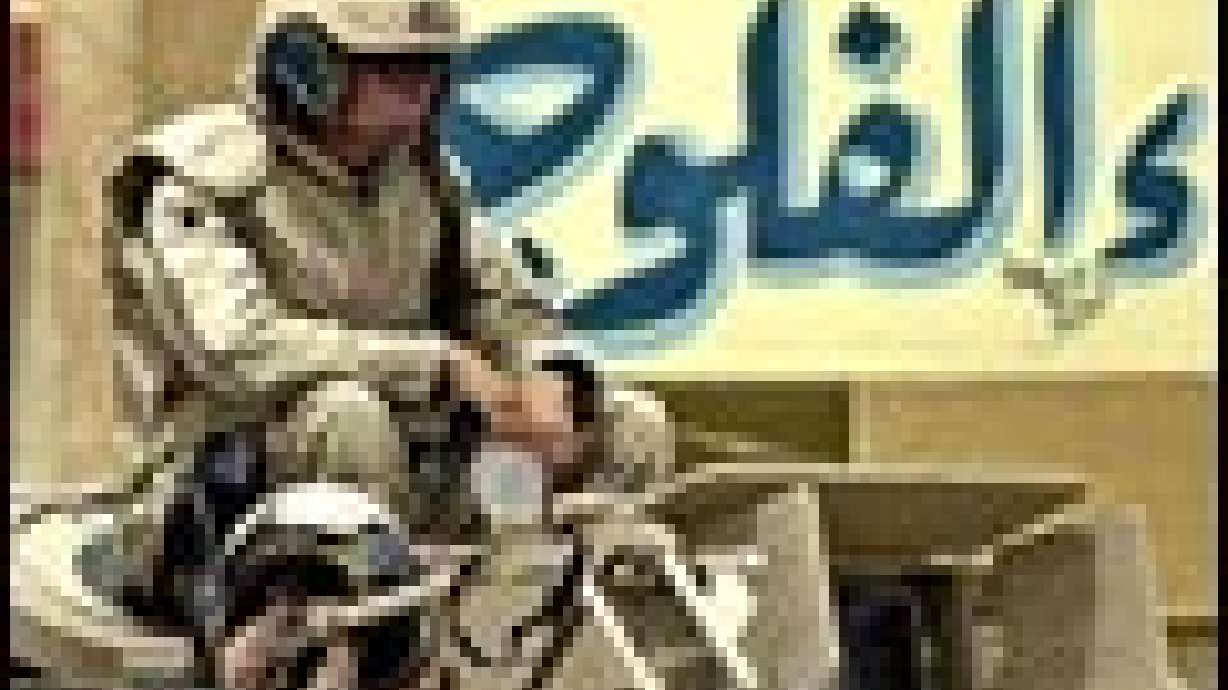Estimated read time: 5-6 minutes
This archived news story is available only for your personal, non-commercial use. Information in the story may be outdated or superseded by additional information. Reading or replaying the story in its archived form does not constitute a republication of the story.
BAGHDAD, Iraq (AP) -- Iraqi authorities blamed Saddam Hussein loyalists for the assassination Saturday of a deputy foreign minister, gunned down on his way to work in a fresh challenge to the interim government due to take power June 30.
Bassam Salih Kubba, 60, Iraq's most senior career diplomat, was mortally wounded when gunmen drove up behind his car in the city's Azimiyah district and opened fire, Foreign Ministry spokesman Thamir al-Adhami said.
The assailants then passed the stricken vehicle and fired a second time, the spokesman said. Kubba's driver escaped injury, but Kubba died in a hospital.
Azimiyah is a predominantly Sunni Muslim neighborhood where Saddam took refuge as American forces overran the city in April 2003 and support for the former regime runs strong there.
The Foreign Ministry said in a statement that the attack "bears all the hallmarks of leftover supporters of Saddam Hussein's evil regime."
Kubba, himself a Sunni, was the second senior Iraqi figure to be killed in the last three weeks and the first since U.N. envoy Lakhdar Brahimi appointed the new leadership to take power at the end of this month.
Izzadine Saleem, a Shiite who at the time headed the now-disbanded Iraqi Governing Council, was killed May 17 in a suicide car-bombing near the entrance to the heavily fortified Green Zone headquarters of the American-run occupation authority.
Ten days later, gunmen ambushed the convoy of another Governing Council member, Salama al-Khafaji, south of Baghdad, killing her son and her chief bodyguard.
U.S. authorities had warned of escalating violence in the run-up to the sovereignty transfer as insurgents seek to undermine public confidence in the new administration. The Americans hope that the establishment of a sovereign Iraqi government will take the steam out of the insurgency, allowing security to improve so that balloting for an elected administration can be held by the end of January.
Although the Iraqis will run their own affairs after June 30, about 150,000 U.S. and other coalition troops will remain in the country to held improve security under a U.N. resolution approved unanimously by the U.N. Security Council on Tuesday.
Brig. Gen. Mark Kimmitt, deputy operations chief, said the Americans had no intention of withdrawing quickly from Baghdad and other cities despite the sovereignty transfer. He said U.S. and other multinational forces would remain a visible force until Iraqis were ready to ensure their own security.
"I don't think you're going to see much difference on July 15 than you saw on January 15," Kimmitt said. "We will not be pulling out of the cities. We will not be relocating. We certainly would like to see more and more Iraqi security forces at the lead."
In a sign of the continuing security crisis, a Lebanese Foreign Ministry official said a Lebanese construction worker, Hussein Ali Alyan, had been shot dead by kidnappers and his body found Saturday near Fallujah.
The official, Mohammed Issa, said Alyan was among three Lebanese who had been abducted by Iraq although he did not say when. One was freed and the other is missing.
Hassan Hijazi, the senior Lebanese diplomat in Baghdad, told the privately owned Voice of Lebanon radio that gunmen wearing Iraqi police uniforms were kidnapping foreigners with the aim of seeking ransoms.
On Saturday, seven Turkish contractors who had been abducted while working for a Turkish construction company were freed in Fallujah by their captors. Serdar Adali, a director of the Turkish construction company which employed them, told CNN-Turk television that "prominent families" in Iraq had helped secure the release.
More than 40 people from several countries have been abducted in Iraq since April -- although many of them have been released or freed by coalition soldiers.
Three Americans -- Pfc. Keith M. Maupin of Batavia, Ohio, William Bradley of Chesterfield, N.H. and Timothy Bell of Mobile, Ala. -- are missing since their convoy was attacked April 9 outside Baghdad. Many of the kidnappings appear to have occurred between the Sunni Muslim cities of Ramadi and Fallujah, scene of a three-week siege by Marines in April after the savage killing of four employees of the U.S. security firm Blackwater USA.
Following an international outcry over the siege, the Marines withdrew and handed security over to an Iraqi force made up of former Iraqi army officers -- and some insurgents. Ten Marines and hundreds of Iraqis died in the siege, which ended with the Blackwater killers still at large.
During a press conference Saturday, Kimmitt acknowledged that Americans had not achieved their goals in Fallujah despite relative calm in the city, where hardline Islamic clerics now hold sway.
"There's still a long way to go in Fallujah before the coalition, and for that matter the Iraqi government, can be satisfied that we have brought Fallujah to resolution," Kimmitt said.
In other developments:
-- The U.S. military announced plans to release another 650 prisoners Monday from the notorious Abu Ghraib prison, center of the abuse scandal. A week ago, the U.S. Army freed 320 detainees, bringing down the number of inmates to about 3,100.
-- Three U.S. soldiers were wounded Saturday in southern Baghdad after homemade bomb believed set off by a cell phone near a U.S. convoy. Troops detained a man running seen running from the area.
-- Two U.S. soldiers were wounded when a bomb exploded in Baqouba, 40 miles northeast of Baghdad.
(Copyright 2004 by The Associated Press. All Rights Reserved.)









